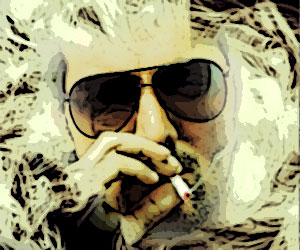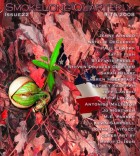“He had to show discipline.” In discipline, hides “disciple” and of course the sense of discipline as punishment, training, systems, rules, control, and habits. What discipline works its way throughout “True Identity”?
In the context of any story there is the discipline of the characters and the discipline of the author. For the character in this case, it’s simply that he has to not seem rude. He has to be a “good boy.” He seems to be riding a storm of various emotional states—he’s calm and rested at first but feels anxious when the bus gets more crowded, maybe he gets aroused, then he’s tired again. You can’t show these emotions when you’re on a bus though. Public Transportation is a place where it’s best to just blend in and be quiet. It’s like a Zen state. So that’s his discipline. As the writer, my discipline is to expose these things inside of him and throw them out there, like word bubbles or thought bubbles, in the air. The writer’s discipline is to make the scene transparent.
What a place—somewhere between skin and deeper parts! What else resides there?
Sometimes, just as a reflex you scratch a scab or a bug bite and it starts to bleed. So there is blood there. And for some people, when they bleed they feel the pain or pressure release from their body. So maybe underneath the blood is the soul of your pain.
There are other things too, depending on what you’ve eaten that day.
The “two by two” invokes (at least for me) Noah, the Flood, the ark. Is there any of Noah in this ending? If so, how does it inform the ending and the rest of the story?
Although I grew up Catholic, there was no religious imagery meant. But I always like it when people see things like that in my work. It’s kind of funny. The “two by two” could be a sort of metaphor as well. You know, pairs of feet, maybe pairs of people or couples, and he’s there all alone and daydreaming about who these people are. And then they go away. Sometimes when you’re already sad, those subtle symbolic moments are shattering.
Word on the street is that you have a memoir coming out, The Suitcase. Tell us all you can about writing it, sending out to publishers, its publication, and when and where we can get a copy.
The Suitcase is a memoir I sold recently to Harper Perennial and I think it’s due out in fall of 2009. It’s mostly about growing up in a family that I thought was fairly dull and normal but really wasn’t. A lot of the book is made up of little anecdotes about my youth with a lot of embarrassing secrets and some shockingly dark moments as well. The most surprising thing about writing it—and I’m actually still working on it for a couple more months—is that it’s much more emotional than I expected. There are many scenes where I just started crying as I’m writing them. I was very lucky to have sold it the way I did actually. It was pretty small when I started working with my agent early this year and then my dad passed away in March and the story just opened up to me. There were many things learned that month. So I wrote a letter to the people at Harper Perennial telling them about these weird things I’ve learned and other new things I wanted to try exploring and I guess they liked what they read. Harper Perennial was the only publisher I pitched it to. Both my agent, Michael Murphy, and myself felt like they were maybe the only place where it would fit. I think they do terrific books and I like that they take chances and actually break a lot of rules as a major press.
Begin this answer with the words, “I write.” Complete the sentence. Then, write as many sentences as you’d like, each one beginning with that “I write….”
I write so that people might learn more about people. I write to learn more about myself. I write so I can learn what people will do and say in certain situations. I write mostly in silence. I write only a couple of days a week. I write much less than I’d like to. I write more often than I think I do. I write sometimes with music on. I write sometimes to make people uncomfortable…but in a way that hopefully makes them learn something.



 The SmokeLong Grand Micro Contest (The Mikey) is now an annual competition celebrating and compensating the best micro fiction and nonfiction online.
The SmokeLong Grand Micro Contest (The Mikey) is now an annual competition celebrating and compensating the best micro fiction and nonfiction online.